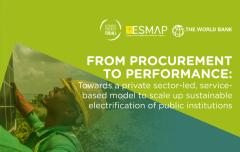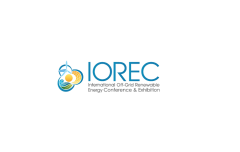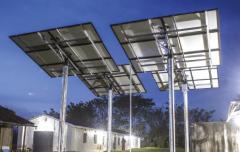Rethinking delivery models for electrifying public institutions
The COVID-19 pandemic has underscored the vital role reliable electrification plays in the provision of essential services, particularly in the health and education sectors. A new knowledge brief, co-authored by SEforALL and World Bank/ESMAP, challenges status quo models for electrifying essential public institutions that have not been able to place an adequate focus on long-term operations and maintenance that is imperative for sustainable service.
Long before the pandemic, development partners have been supporting governments in providing power solutions to health facilities and schools, though too often interventions have failed to deliver in the long term.
The majority of these interventions have followed a traditional grant-based donor-funded model, focusing largely on the procurement of power generating assets (e.g. solar PV and storage solutions). This focus, along with typically shorter project timelines (e.g. less than 5 years), have led interventions to prioritize the deployment of funds towards procurement of assets rather than longer-term operation and maintenance.
This lack of financial and human resources over the long-term compromises long-term sustainability, and is well described in SEforALL’s Lasting Impact report and the World Bank’s publication - Increasing Human Capital by Electrifying Health Centers and Schools through Off-Grid Solar Solutions.
Poor longer-term performance, along with lessons learnt from off-grid solar electrification of households and the supply of other social goods (e.g. water), has led key stakeholders to explore a different mechanism, namely a service-based model that places the focus on the delivery of service rather than procurement of equipment. This has also opened the opportunity to leverage private sector financing and innovations in technology (e.g. remote monitoring) to create a market for electrification of public institutions, spurring increased international advocacy.
The new knowledge brief, titled From Procurement to Performance: Towards a private sector-led, service-based model to scale up sustainable electrification of public institutions, outlines the advantages of the service-based model, specifically how it leverages the expertise and capital of the private sector to deliver energy services to public institutions while ensuring financing and incentives are structured over a longer time period.
Switching from the more traditional asset-focused model to a service-focused model can help facilitate long-term and sustainable electricity as a service at public institutions such as schools and health centres. Several new barriers need to be addressed for a service-based model to be feasible. These include:
- the affordability of energy services and the public sector’s ability to pay for them
- the willingness of the private sector to raise capital for these interventions
- the high transaction costs, largely due to geographically dispersed demand
- the risk of grid extensions
- the continuation of more traditional grant-based donor-funded models that focus on procurement of power generation assets
- the risk of crowding out national companies
The brief describes these barriers and presents several solutions to break down or avoid them. It also describes several case studies of planned and ongoing pilot projects that are variations of the service-based model.
Finally, to further advance the service-based model, the brief calls for:
- Increased investment in data, in particular on the location, energy status and energy needs of public facilities.
- Donors and development finance institutions (DFIs) to support the experimentation and demonstration of different service-based models through grants and pilots.
- Greater dialogue between energy and health/education stakeholders, as well as public- and private-sector stakeholders regarding the need to prioritize sustainable electrification of public institutions and secure payments for service.
- Greater buy-in, support and coordination among a range of stakeholders, including governments, DFIs, service providers and investors to support a long-term focus on the delivery of electricity as a service to public institutions, such as schools and health centres, through the integration of quality assurance, remote monitoring, payment security, and institutional partnerships.
SEforALL and the World Bank/ESMAP are committed to advancing the above-mentioned recommendations and invite our partners and other key stakeholders to join us in exploring how a performance-based service model can contribute to the sustainable electrification of public institutions.
Join us for the Deep dive: Service-based approaches to electrify social infrastructure during IOREC 2021, on 9 December, 4:30 pm-5:30 pm UAE / 1:30 pm-2:30 pm Geneva / 7:30 am-8:30 am Washington DC. Find out more here.




